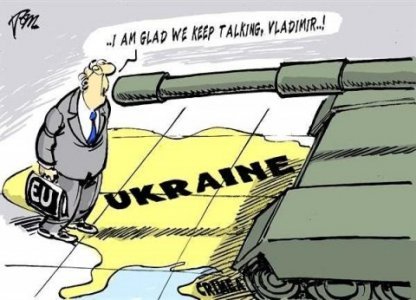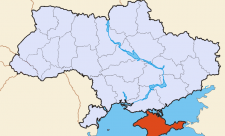 The latest stage of the “Normandy” format negotiations demonstrated that the European Union is more interested in establishment of formal peace in the east of Ukraine rather than in real conflict resolution. Reproaches addressed to Kiev on non-compliance with the Minsk agreements start to sound with increasing frequency in the West. Moscow insists on its conditions of “peace” and the peacemakers issue becomes irrelevant.
The latest stage of the “Normandy” format negotiations demonstrated that the European Union is more interested in establishment of formal peace in the east of Ukraine rather than in real conflict resolution. Reproaches addressed to Kiev on non-compliance with the Minsk agreements start to sound with increasing frequency in the West. Moscow insists on its conditions of “peace” and the peacemakers issue becomes irrelevant.
On April 13, the meeting of “Normandy Four” heads of foreign offices took place in Berlin. At the lead-up of the meeting, Ukrainian side expected to pay special attention to the matter of sending the peacemaker mission to the conflict zone.
In the course of negotiations, the head of Ukrainian diplomacy Pavel Klimkin tried to convince partners that such mission is exceptionally essential, assuring that Kiev does not consider the peacemakers as the OSCE mission replacement but reckon them as another facilitation of stability in the region. “These two missions are complementary and not mutually exclusive,” the minister noted and added that “we need an effective mission… We have the monitoring mission of OSCE, which is presently responsible for monitoring and verification. However, we need stabilization of the situation, we need to save the ones who live in Donetsk and Lugansk from the terrorists, and we need to bring the law and order back to them.”
However, despite all the efforts of the Ukrainian diplomacy, the peacekeeping contingent issue remained untouched in the Final Communique of the meeting. At the same time, appeals for termination of armed hostilities and compliances with the Minsk agreements to the full extent sounded once again. An additional agreement on withdrawal of all kind of tanks and weapons with the caliber less than 100 mm has been reached.
Europe is still concerned about battles in the Donetsk and Lugansk regions, however, it insists that the peace and quiet order is observed. “Cease-fire is observed up to the adequate level in eastern Ukraine, however, clashes still happen in two or three settlements,” the head of Ministry of Foreign Affairs of Germany Steinmeier noted.
The issue of military involvement into the conflict in the east of Ukraine and appeals of official Kiev addressed to the West with a request to send its troops to the frontline only scare Europe. There are more and more announcements that the arms deliveries may cause a new phase of the conflict and aggravate the current situation. Certain European politicians avows about their disinclination to be involved into confrontation and urge Kiev to make concessions with Moscow.
The EU representative in Russia Vygaudas Ušackas says directly: “It must be admitted that we won’t go fight and die for Ukraine and we won’t go to change Russia, because we won’t do that.”
For its part, Russia continues to accuse Ukraine of obstructing implementation of agreements reached in Minsk. In particular, it comes to delaying the implementation of a whole range of political reforms including holding elections in the “LNR” and the “DNR”.
“Speaking about the Minks agreement, every one admits that the main obstacles to the realization of this document are actions of the official authorities in Kiev. It is unwillingly admitted even in European capitals,” the minister of Foreign Affairs of Russia Sergey Lavrov emphasized.
The head of the Russian Foreign Affair ministry announced about necessity of the relief of the economic blockage of Donbass, which is “wrong and harmful”.
The number of those who support rescinding sanctions against Russia grows in Europe and Moscow uses it ably. Brussels has neither possibility nor wish to provide military support for Kiev. Position of the Russian Federation in the Security Council of the UNO makes the perspective of sending the peacemakers to the conflict zone unreal. Under these conditions, there is nothing to do for Ukraine but focus on the optimal options of regulation of the situation in the East. The OSCE mission remains such an option despite all the disadvantages. It is needed to continue to insist on qualitative improvement of the mission, expansion of its authorities and technical capacity for more efficient control of the Minsk agreements compliance. Besides that, it is needed to more actively involve European partners to the improvement of the economic and humanitarian situation in the Donetsk and Lugansk regions.
Andrey Trutenko












